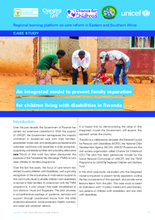Over the past decade, the Government of Rwanda has carried out extensive care reforms. With the support of UNICEF, the Government reintegrated the majority of children in residential care with their families, established foster care, and developed a professional and volunteer workforce with expertise in child protection, supporting vulnerable families and providing alternative care. Much of this work has taken place under the auspices of the Tubarerere Mu Muryango (TMM) or Let's raise children in families programme.
Over the last five years, the focus of care reform has shifted towards children with disabilities, with a growing recognition of the importance of multi-sector support at the community level to enable children with disabilities to remain in their families. In conjunction with the TMM programme, a pilot project has been established in two districts, Huye and Bugesera. The pilot provides a comprehensive package of guidance, services and support through coordinated inputs from the child protection, education, social protection, health, nutrition, and water and sanitation sectors.
It is hoped that by demonstrating the value of this integrated model the Government will expand this approach across the country.
The pilot is a collaboration between the National Council for Persons with Disabilities (NCPD), the National Child Development Agency (NCDA), UNICEF Rwanda and the civil society organization called Chance for Childhood (CfC). The pilot has been generously funded by the Swiss National Committee of UNICEF, and the TMM Programme by USAID's Displaced Children and Orphans Fund.
This short case study explains why this integrated model is important to prevent family separation, outlines the key components of this approach, and provides some lessons learnt from the pilot. This case study is based on interviews with 13 policy makers and practitioners, two parents of children with disabilities, and one child with disabilities.
See also: Video: An integrated approach to care reform for children with disabilities in Rwanda
This resource was developed as a part of the Eastern and Southern Africa Regional Learning Platform. Click here to see all learning products developed through the platform.

